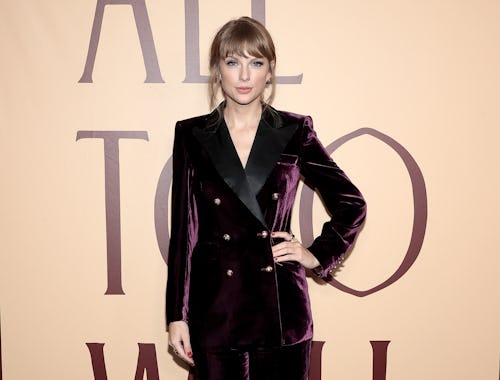
New York University’s Clive Davis Institute is now offering a course on Taylor Swift, in case the anti-liberal elite education camp needed any more reasons to complain about fancy, big city degrees. And, surprise, the course already has a long waiting list. Per Variety, the class will be taught by Rolling Stone’s Brittany Spanos and cover, “Swift’s evolution as a creative music entrepreneur, the legacy of pop and country songwriters, discourses of youth and girlhood, and the politics of race in contemporary popular music.” But the whole thing begs the question...who needs this?
A portion of the course description reads, “This course proposes to deconstruct both the appeal and aversions to Taylor Swift through close readings of her music and public discourse as it relates to her own growth as an artist and a celebrity. Through readings, lectures and more, the class delves into analyses of the culture and politics of teen girlhood in pop music, fandom, media studies, whiteness and power as it relates to her image and the images of those who have both preceded and succeeded her. We’ll also consider topics like copyright and ownership, American nationalism and the ongoing impact of social media on the pop music industry.” Don’t get me wrong, I’m a pop culture nerd, and that description sounds genuinely interesting — but it also sounds like a far-reaching attempt to make a deep dive into a character like Swift seem valuable.
Swift is a polarizing pop star, and she’s been through many seasons of both her artistry and fame. She’s of course an incredibly talented songwriter and businesswoman, but so are Adele, Beyonce, and Lady Gaga, who have made more nuanced and less self-obsessed contributions to society. Swift is a beacon of white womanhood and a masterclass in white privilege. And while the class promises to unpack race and pop stardom, it feels like Swift could be a part of a course on just that topic, rather than the catalyst for the conversation. But that’s Swift’s insistence on her own fame paying off — just as it did during her 1989 era filled with flaunting famous women around as props and a never-ending, self-created press cycle that altered her image from country to pop. Much of Swiftdom feels like the orchestrations of a megalomaniac. And while pop stardom is inherently narcissistic, there’s something especially off-putting about putting Swift’s brand of ballerina-flatted, pumpkin spice latte’d, teardrops-on-my-guitar brand on a pedestal.
Contextualizing pop culture’s contributions to society is not frivolous, but the singular focus on Swift is what’s disconcerting. There just are more profound ways to frame and provide insight into the impact of pop culture figures in courses that take that approach like Copenhagen University’s “Beyoncé, Gender and Race,” University of South Carolina’s “Lady Gaga and the Sociology of Fame,” or the University of Leeds’ “Bowie, Reading and Writing.” NYU itself has taught other singularly focused pop culture courses like Questlove’s 101 on Prince or his lecture on classic albums, or Jay-Z coming to guest lecture on the music business — but those courses offer practical real-world applications from the study of the famous people in question, be it the business side or the artistry side.
This isn’t about Taylor Swift hate. I love her music, and think she’s an incredibly savvy businesswoman. I also think she could have a valid educational contribution like a guest lecture on copyrights and ownership in the music business. But the Taylor course itself feels like just another ramification of her years-long insistence on centering white womanhood. Forcing “American nationalism” as a topic in a Taylor Swift course is the kind of far-reaching necessary to make it feel intellectual to study the star under a microscope. Swift has been invited to speak to the class, but it’s not reported yet if she expressed interest — but I’d wager she won’t be able to stay far away from something so self-congratulatory.







